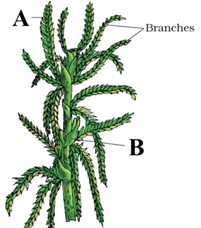- Tardigrade
- Question
- Biology
- Study the following columns and choose the correct option. Column- II (A) Population (1) Part of the earth consisting of all the ecosystems of the world (B) Community (2) assemblage of all the individuals belonging to different species occurring in an area (C) Ecosystem (3) Group of similar individuals belonging to the same species found in an area (D) Ecosphere (4) Interaction between the living organisms and their physical environment components (5) Classification of organisms based on the type of environment
Q.
Study the following columns and choose the correct option.
Column- II (A) Population (1) Part of the earth consisting of all the ecosystems of the world (B) Community (2) assemblage of all the individuals belonging to different species occurring in an area (C) Ecosystem (3) Group of similar individuals belonging to the same species found in an area (D) Ecosphere (4) Interaction between the living organisms and their physical environment components (5) Classification of organisms based on the type of environment
| (A) | Population | (1) | Part of the earth consisting of all the ecosystems of the world |
| (B) | Community | (2) | assemblage of all the individuals belonging to different species occurring in an area |
| (C) | Ecosystem | (3) | Group of similar individuals belonging to the same species found in an area |
| (D) | Ecosphere | (4) | Interaction between the living organisms and their physical environment components |
| (5) | Classification of organisms based on the type of environment |
Solution:
Ecology is basically concerned with four levels of biological organization - organisms, populations, communities, ecosystems, and biomes.
A population is a group of similar individuals in a particular geographical area or space. Community is the assemblage of interdependent and interacting populations of different species present in an area. The ecosystem is the sum of the biotic (living) and abiotic (non-living) components of a particular geographical area. The biosphere also called the ecosphere or giant ecosystem is the largest and nearly self-sufficient biological system. It is formed of all the ecosystems of the world. It is also called the "life-supporting zone" of the earth.
Questions from NTA Abhyas 2022
Biology Most Viewed Questions
1. In a cross between a male and female, both heterozygous for sickle cell anaemia gene, what percentage of the progeny will be diseased ?
NEET 2021
Principles of Inheritance and Variation
2. identify the substances having glycosidic bond and peptide bond, respectively in their structure
NEET 2020
Biomolecules
3. Choose the correct pair from the following
NEET 2020
Biotechnology : Principles and Processes
4. Match the following columns and select the correct option.
Column I
Column II
a
Gregarious, polyphagous pest
i
Asterias
b
Adult with radial symmetry and larva with bilateral symmetry
ii
Scorpion
c
Book lungs
iii
Ctenoplana
d
Bioluminescence
iv
Locusta
| Column I | Column II | ||
|---|---|---|---|
| a | Gregarious, polyphagous pest | i | Asterias |
| b | Adult with radial symmetry and larva with bilateral symmetry | ii | Scorpion |
| c | Book lungs | iii | Ctenoplana |
| d | Bioluminescence | iv | Locusta |
NEET 2020
Animal Kingdom
5. The roots that originate from the base of the stem are:
NEET 2020
Anatomy of Flowering Plants
6. In which of the following techniques, the embryos are transferred to assist those females who cannot conceive ?
NEET 2020
Reproductive Health
7. Identify the wrong statement with reference to the gene T that controls ABO blood groups.
NEET 2020
Principles of Inheritance and Variation
8. Select the correct match
NEET 2020
Principles of Inheritance and Variation
9. Which of the following is not an attribute of a population ?
NEET 2020
Organisms and Populations
10. The infectious stage of Plasmodium that enters the human body i s
NEET 2020
Human Health and Disease
Latest Updates
- JEE Main 2023 February 25th Shift 1 Morning
- JEE Main 2023 February 25th Shift 2 Evening
- JEE Main 2023 January 31st Shift 1 Morning
- JEE Main 2023 January 31st Shift 2 Evening
- JEE Main 2023 January 30th Shift 1 Morning
- JEE Main 2023 January 30th Shift 2 Evening
- JEE Main 2023 January 25th Shift 1 Morning
- JEE Main 2023 January 25th Shift 2 Evening
- JEE Main 2023 January 24th Shift 1 Morning
- JEE Main 2023 January 24th Shift 2 Evening
- JEE Main 2023 February 1st Shift 1 Morning
- JEE Main 2023 February 1st Shift 2 Evening
- JEE Main 2022 July 25th Shift 1 Morning
- JEE Main 2022 July 25th Shift 2 Evening
- JEE Main 2022 July 26th Shift 1 Morning
- JEE Main 2022 July 28th Shift 1 Morning
- JEE Advanced 2022 Paper 2
- JEE Advanced 2022 Paper 1
- JEE Advanced 2021 Paper 2
- JEE Advanced 2021 Paper 1
- JEE Advanced 2020 Paper 2
- JEE Advanced 2020 Paper 1
- NEET 2022 Physics Answer Key
- NEET 2022 Chemistry Answer Key
- NEET 2022 Botany Biology Answer Key
- NEET 2022 Zoology Biology Answer Key
- NEET Rank Predictor 2023
